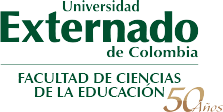25 de junio de 2018
In-service Teachers as Teacher-researchers and Materials Developers
The serious concerns in terms of education we are dealing within our modern societies demand from teachers a real commitment to the increasingly changing local communities’ needs. To cope with these requests, the state-funded schools rely on the role of in-service teachers as researchers and materials developers. Hence, this article expresses the importance of this triple role teachers perform which facilitates better learning experiences and brings benefits for the state-funded school context and the communities it addresses.
Freddy Alejandro Segura M.A.
The serious concerns in terms of education we are dealing within our modern societies demand from teachers a real commitment to the increasingly changing local communities’ needs. To cope with these requests, the state-funded schools rely on the role of in-service teachers as researchers and materials developers. Hence, this article expresses the importance of this triple role teachers perform which facilitates better learning experiences and brings benefits for the state-funded school context and the communities it addresses.
The role of in-service teachers as teacher-researchers and materials developers gains reputation nowadays when teachers from the state sector are constantly undervalued and whose achievements have been underestimated. Giroux (1990) stated that there is a threat represented by a series of educative reforms that reflect the lack of trust on public school teachers and their skills to lead an intellectual and moral change in favor of the youths. In view of this, in-service teachers’ role as researchers and materials developers is a response to this problematic issue in the sense that they can generate considerable changes in the way teaching and learning occur, and which brings substantial benefits to students from state-funded schools.
In this regard, teacher – researchers systematize and organize the teaching practice as an exercise of constant reflection to realize weaknesses of their own teaching and difficulties in students’ teaching (McLean, 1995). What is significant about this reflective process is expressed by Kumaravadivelu (2003), “Teachers not only articulate their criteria for developing and evaluating their own practice but also engage in extensive theorizing about the nature of their subjects, their students, and learning/teaching processes” (p. 21). This is the result of theorizing and knowing deeply what implies the effects of proper teachings is students’ learning. Besides, teacher research is embedded into what has been coined as ‘action research’, which is a type of research suitable “to extend our teaching skills and gain more understanding of ourselves as teachers, our classrooms and our students” (Burns, 2009, p. 1). All in all, teacher research improves the educational practice (Mertler, 2008) which results in teachers’ professional growth bringing about benefits to the entire school community.
There is one additional aspect that must be addressed in this article, which is the possibility that in-service teachers have to self-design appropriate teaching materials since “all teachers are potential materials developers” (Núñez & Téllez, 2009, pp. 183-4). In-service teachers as materials developers is also a desirable condition that accounts for teachers’ autonomy and professional growth. It is necessary to reaffirm the importance of this autonomy and professionalism in that “teachers as innovative professionals have the potential to explore their creativity by designing materials for their classes” (Núñez, Pineda and Téllez 2004, p. 130), which also helps in-service teachers generate innovative and pertinent environments. This fact contributes to break with the customary forms of teaching in the state-funded schools for instance, since in-service teachers as producers of contextualized materials [that]are aimed at providing students with meaningful input (Núñez, Téllez & Castellanos, 2017, p. 36) and that can transform learners’ lives as there is the opportunity to provide the settings for students to learn happily, meaningfully and in a relaxed atmosphere.
To conclude, there is a close connection among being a teacher, a researcher and a materials developer. Each of these three roles complements the other. The teacher is attentive to the way students can learn best and meaningfully whereas the researcher regards features of theories, principles, concepts and methodologies (Harwood, 2010; Tomlinson, 2011). Likewise, as a materials designer, in-service teachers’ effort is to produce proper materials aimed at compensating the students’ different learning limitations. This is because there is a need that vulnerable communities have equal access to and attain suitable and responsible knowledge (Fals Borda, 1999). Given this situation, an essential aspect of the teaching practice is that vulnerable communities can also benefit from the research, the contextualized materials produced by in-service teachers and the learning process undertaken at school.
_______________________________________
References
Borda, O. F. (1999). Orígenes universales y retos actuales de la IAP (investigación acción participativa). Análisis politico, (38), 71-88.
Burns, A. (2009). Doing action research in English language teaching: A guide for practitioners. New York. Routledge.
Giroux, H. (1990). Los profesores como intelectuales. Barcelona, Paidos.
Harwood, N. (2010). English Language Teaching Materials: Theory and Practice. Cambridge University Press.
Kumaravadivelu, B. (2003). Beyond methods: Macrostrategies for language teaching. New Haven: Yale University Press.
McLean, J.E. (1995). Improving education through action research: A guide for administrators and teachers. Thousand Oaks, CA: Corvin Press.
Mertler, C. (2008). Action research:Teachers as researchers in the classroom. Los Angeles. Sage.
Núñez, A., Pineda, C. & Téllez, M. (2004). Key Aspects for Developing your Instructional Materials. PROFILE Issues in Teachers’ Professional Development, 5,128-139.
Núñez, A., & Téllez, M. (2009). ELT materials: the key to fostering effective teaching and learning settings. PROFILE Issues in Teachers’ Professional Development, 11(2).
Núñez, A., Téllez, M. F., & Castellanos, J. (2017a). Teacher–developed materials for teachers’ professional growth. In A. Núñez, M. F. Téllez, & J. Castellanos (Eds.), Materials for the learning of English and teachers’ professional growth (pp. 19-68). Bogotá: Departamento de Publicaciones, Universidad Externado de Colombia.
Tomlinson, B. (2011). Materials development in language teaching. (Second ed.). Cambridge University Press.


